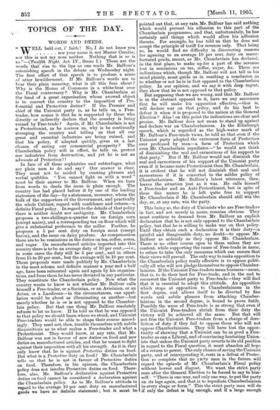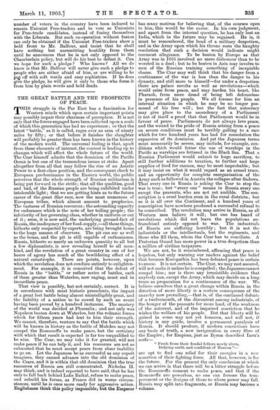nor your name is not Master Cesario; nor this is
not my nose neither. Nothing that is so is so."—(Twelfth Night, Act IV., Scene 1.) These are the words that rise to the lips as one reads Mr. Balfour's astonishing speech in the debate on Wednesday night. The first effect of that speech is to produce a sense of utter bewilderment. If Mr. Balfour's words are to bear their plain meaning, what is all this fuss about ? Why is the House of Commons in a white-heat over the Fiscal controversy ? Why is Mr. Chamberlain at the head of a great organisation whose avowed object is to convert the country to the imposition of Pre- ferential and Protective duties ? If the Premier and chief of the Unionist party is, as he tells us, a Free- trader, how comes it that he is supported by those who directly or indirectly declare that the country is being ruined by Free-trade ? Again, if Mr. Chamberlain is not a Protectionist, as he assures us, why is he continually stumping the country and telling us that all our great and essential industries are being ruined, and that his policy, if ' adopted quickly, gives us a last chance of saving our commercial prosperity ? The Chamberlain policy will in effect, he tells us, protect our industries from destruction, and yet he is not an advocate of Protection ! !
In face of all these sophistries and subterfuges, what are plain men to do and say ? Our answer is clear. They must not be misled by cunning phrases and verbal quibbles. " You cannot fight us with a word " must be their answer to Mr. Balfour. When we turn from words to deeds the issue is plain enough. The country has had placed before it by one of the leading statesmen of the day—by a statesman, moreover, whom the bulk of the supporters of the Government, and practically the whole Cabinet, regard with confidence and esteem—a definite Fiscal policy. In regard to the details of that policy there is neither doubt nor ambiguity. Mr. Chamberlain proposes a two-shillings-a-quarter tax on foreign corn (except maize), and a corresponding tax on flour which will give a substantial preference to the miller. Further, he proposes a 5 per cent. duty on foreign meat (except bacon), and the same on dairy produce. As compensation there are to be remissions in the duties on tea, coffee, cocoa, and sugar. On manufactured. articles imported into this country there is to be an average duty of 10 per cent.,—i.e., in some cases the duty will be 5 per cent., and in others from 15 to 20 per cent., but the average will be 10 per cent. These proposals were made publicly by Mr. Chamberlain in the most solemn and definite manner a year and a half ago, have been reiterated again and again by his organisa- tions, and from them he has never deviated in any particular. They constitute the Chamberlain policy. Now what the country wants to know is not whether Mr. Balfour calls himself a Free-trader, or a Socinian, or an Arminian, or an Arian, or a Laodicean—in the circumstances, one appel- lation would be about as illuminating as another—but merely whether he is or is not opposed to the Chamber- lain policy. But that one thing Mr. Balfour resolutely refuses to let us know. If he told us that he was opposed to that policy we should learn where we stood, and Unionist Free-traders would be able to shape their course accord- ingly. They need not, then, trouble themselves with subtle disquisitions as to what makes a Free-trader and what a Protectionist. They would know, at any rate, that Mr. Balfour was not in favour of new duties on food and new duties on manufactured articles, and that he meant to fight against their imposition with all his strength. As it is, they only know that he is against Protective duties on food. But what is a Protective duty on food? Mr. Chamberlain tells us that he is not in favour of Protective duties on food. Therefore, in his opinion, the Chamberlain policy does not involve Protective duties on food. There- fore, also, Mr. Balfour's declaration against Protective duties on food cannot be considered a declaration against the Chamberlain policy. As to Mr. Balfour's attitude in regard to the average 10 per cent. duty on manufactured goods we have no definite statement ; but it must be pointed out that, at any rate, Mr. Balfour has said nothing which would prevent his adhesion to this part of the Chamberlain programme, and that, unfortunately, he has certainly said things which would allow his adhesion thereto. For example, he has told us that he does not accept the principle of tariff for revenue only. That being so, he would find no difficulty in discovering reasons for agreeing to an average 10 per cent. duty on manu- factured goods, meant, as Mr. Chamberlain has declared, in the first place, to make up for a part of the revenue lost in remissions on tea, coffee, sugar, &c. These are indications which, though Mr. Balfour will not tell us his mind plainly, must guide us in reaching a conclusion as to whether or not he is in fact opposed to the Chamberlain policy. In our opinion, and we say it with deep regret, they show that he is not opposed to that policy.
But supposing that we are wrong, and that Mr. Balfour is in the abstract opposed to it, have we any assurance that he will make his opposition effective,—that is, will declare war on that policy, and do his best to defeat it when it is proposed to the nation at the General Election ? Alas ! on this point the indications are clear and precise. Mr. Balfour does not mean to stand up against and declare war on Chamberlainism. In the Edinburgh speech, which is regarded as the high-water mark of Mr. Balfour's Free-trade views, he told us that even if the Unionist party adopted the extremest form of Protection ever professed by man—a form of Protection which even Mr. Chamberlain repudiates—" he would not think of diminishing the zeal and earnestness of his support to that party." But if Mr. Balfour would not diminish the zeal and earnestness of his support of the Unionist party even if it became more Protectionist than Mr. Chamberlain, it is evident that he will not diminish that zeal and earnestness if it is converted to the milder policy of Chamberlainism. Mr. Balfour's latest utterance, then, leaves the situation just as it was. He calls himself a Free-trader and an Anti-Protectionist, but in spite of these fine names he is left quite free to support Mr. Chamberlain if Mr. Chamberlain should still win the day, or, at any rate, win the party.
This being so, the duty of Unionists who are Free-traders in fact, and not merely in name, remains obvious. They must continue to demand from Mr. Balfour an explicit declaration that he is not only opposed to the Chamberlain policy, but that he is willing to make war on that policy. Until they obtain such a declaration it is their duty—a painful and disagreeable duty, no doubt—to oppose Mr. Balfour as ardently as they oppose Mr. Chamberlain. There is no other course open to them unless they are content, while supporting the cause of Free-trade in name, to refuse to take the only measures which can ensure that their views will prevail. The only way to make opposition to the Chamberlain policy really effective is to oppose politi- cally all who will not pledge themselves to oppose Chamber- lainism. If the Unionist Free-traders mean business—mean, that is, to do their best for Free-trade, and in the end to reconvert the Unionist party to Free-trade—they will find that it is essential to adopt this attitude. An opposition which stops at opposition to Chamberlainism in the first degree, and allows itself to be diverted by fine words and subtle phrases from attacking Chamber- lainism in the second degree, is bound to prove futile. Possibly the wave of Free-trade is so strong that even if the Unionist Free-traders shrink from their duty the victory will be achieved all the same. But that will not free the Unionist Free-traders from a charge of dere- liction of duty if they fail to oppose those who will not oppose Chamberlainism. They will have lost the oppor- tunity of showing that a Unionist can be as good a Free- trader as can a Liberal, and of convincing hesitating Union- ists that unless the Unionist party reverts to its old position in regard to the Fiscal question, it must abandon all hope of a return to power. The only chance of saving the Unionist party, and of reinvigorating it, rests in a defeat of Protec- tion so complete that no party man in the future will regard the episode of Mr. Chamberlain's Fiscal policy without horror and disgust. We want the strict party man after the General Election to be forced to say to him- self : " There is one way, and only one way, to put the party on its legs again, and that is to repudiate Chamberlainism in every shape or form." This the strict party man will do if only the defeat is big enough, and if a large enough number of voters in the, country have been induced to remain Unionist Free-traders and to vote as Unionists for Free-trade candidates, instead of fusing themselves with the Liberals. But such co-operation without fusion can only be obtained if the Unionist Free-traders show a bold front to Mr. Balfour, and insist that he shall have nothing but unremitting hostility from them until he announces that he is not only opposed to the Chamberlain policy, but will do his best to defeat it. Can we hope for such a pledge ? Who knows ? All we do know is that Mr. Balfour will never give such a pledge to people who are either afraid of him, or are willing to be pi.4 off with soft words and easy sophistries. If he does give the pledge, he will give it only to those who force it from him by plain words and bold deeds.











































 Previous page
Previous page